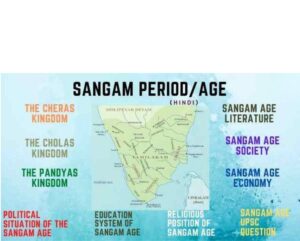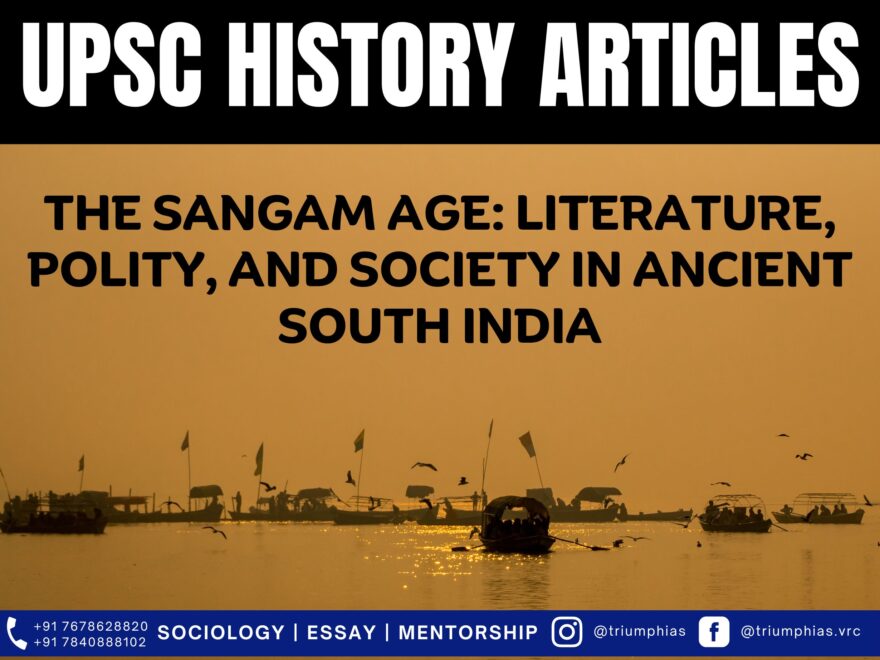The Sangam Age
(Relevant for Historical Section of General Studies Paper Prelims/Mains)

Sangam Age
The period roughly between the 3rd century B.C. and 3rd century A.D. in South India (the area lying to the south of river Krishna and Tungabhadra) is known as Sangam Period. It has been named after the Sangam academies held during that period that flourished under the royal patronage of the Pandya kings of Madurai.
As per Tamil legends, the ancient South India witnessed three Sangam (Academies of Tamil poets) collectively known as Muchchangam:
- The First Sangam, traditionally said to have taken place in Madurai, was attended by gods and legendary sages. Unfortunately, no literary works from this Sangam have survived to this day.
- The Second Sangam convened at Kapadapuram, and from it, only Tolkappiyam has endured as a literary work.
- The Third Sangam, also held in Madurai, left behind a few Tamil literary compositions that serve as valuable sources for understanding the historical context of the Sangam period.
- These academies were instrumental in compiling Sangam literature, which includes Tolkappiyam, Ettutogai, Pattuppattu, Pathinenkilkanakku, and two epic poems known as Silappathikaram and Manimegalai. These literary treasures offer insights into the socio-political landscape of the era.
Sangam Polity and Administration:
- The form of government during the Sangam period was hereditary monarchy.
- Each dynasty in the Sangam age had its own royal emblem, such as the tiger for the Cholas, carp or fish for the Pandyas, and bow for the Cheras.
- The king was supported by various officials organized into five councils: ministers (amaichar), priests (anthanar), envoys (thuthar), military commanders (senapathi), and spies (orrar).
- Military administration was well-structured, with each ruler having a regular army at their disposal.
- The primary source of state revenue was land revenue, supplemented by custom duties on foreign trade.
- The royal treasury was also enriched through the capture of spoils during wars.
- Roads and highways were maintained and protected to prevent robbery and smuggling.
Sangam Society:
- Tolkappiyam categorized the land into five divisions: Kurinji (hilly tracks), Mullai (pastoral), Marudam (agricultural), Neydal (coastal), and Palai (desert).
- The society comprised four main castes: arasar (Ruling Class), anthanar, vanigar (engaged in trade and commerce), and vellalar (Agriculturists).
- The Sangam period was home to ancient primitive tribes like Thodas, Irulas, Nagas, and Vedars.
Position of Women during Sangam Age:
- Women enjoyed respect and were permitted to engage in intellectual pursuits. Notable women poets like Avvaiyar, Nachchellaiyar, and Kakkaipadiniyar thrived during this era and made significant contributions to Tamil literature.
- Women were allowed to choose their life partners, although the lives of widows were often difficult.
The Sangam period slowly witnessed its decline towards the end of the 3rd century A.D. The Kalabhras occupied the Tamil country post-sangam period between 300 AD to 600 AD, whose period was called an interregnum or ‘dark age’ by earlier historians.
Sample Question for UPSC Sociology Optional Paper:
Question 1: What insights do Sangam literature offer about the social hierarchy in the Sangam Period?
Answer: Sangam literature such as Tolkappiyam reveal a society comprising four main castes—arasar (Ruling Class), anthanar, vanigar (engaged in trade and commerce), and vellalar (Agriculturists).
Question 2: What was the role of women in Sangam Age?
Answer: Women enjoyed considerable respect and were permitted to engage in intellectual pursuits. Notable women poets like Avvaiyar made significant contributions to Tamil literature.
Question 3: How did the governance structure function during the Sangam Age?
Answer: The Sangam Age featured a hereditary monarchy supported by five councils of ministers, priests, envoys, military commanders, and spies.
Question 4: What were the sources of state revenue during the Sangam Age?
Answer: The primary source of state revenue was land revenue, supplemented by custom duties on foreign trade and the capture of spoils during wars.
Question 5: What led to the decline of the Sangam period?
Answer: The Sangam period witnessed its decline towards the end of the 3rd century A.D., followed by the Kalabhras’ occupation, which was termed as the ‘dark age’ by historians.
To master these intricacies and fare well in the Sociology Optional Syllabus, aspiring sociologists might benefit from guidance by the Best Sociology Optional Teacher and participation in the Best Sociology Optional Coaching. These avenues provide comprehensive assistance, ensuring a solid understanding of sociology’s diverse methodologies and techniques.
Sangam Age, Tamil Literature, Pandya Kings, Sangam Academies, Ancient South India, Tolkappiyam, Silappathikaram, Manimegalai, Social Structure, Political Governance, Position of Women, Ancient Tribes, Sangam Society

Choose The Best Sociology Optional Teacher for IAS Preparation?
At the beginning of the journey for Civil Services Examination preparation, many students face a pivotal decision – selecting their optional subject. Questions such as “which optional subject is the best?” and “which optional subject is the most scoring?” frequently come to mind. Choosing the right optional subject, like choosing the best sociology optional teacher, is a subjective yet vital step that requires a thoughtful decision based on facts. A misstep in this crucial decision can indeed prove disastrous.
Ever since the exam pattern was revamped in 2013, the UPSC has eliminated the need for a second optional subject. Now, candidates have to choose only one optional subject for the UPSC Mains, which has two papers of 250 marks each. One of the compelling choices for many has been the sociology optional. However, it’s strongly advised to decide on your optional subject for mains well ahead of time to get sufficient time to complete the syllabus. After all, most students score similarly in General Studies Papers; it’s the score in the optional subject & essay that contributes significantly to the final selection.
“A sound strategy does not rely solely on the popular
Opinion of toppers or famous YouTubers cum teachers.”
It requires understanding one’s ability, interest, and the relevance of the subject, not just for the exam but also for life in general. Hence, when selecting the best sociology teacher, one must consider the usefulness of sociology optional coaching in General Studies, Essay, and Personality Test.
The choice of the optional subject should be based on objective criteria, such as the nature, scope, and size of the syllabus, uniformity and stability in the question pattern, relevance of the syllabic content in daily life in society, and the availability of study material and guidance. For example, choosing the best sociology optional coaching can ensure access to top-quality study materials and experienced teachers. Always remember, the approach of the UPSC optional subject differs from your academic studies of subjects. Therefore, before settling for sociology optional, you need to analyze the syllabus, previous years’ pattern, subject requirements (be it ideal, visionary, numerical, conceptual theoretical), and your comfort level with the subject.
This decision marks a critical point in your UPSC – CSE journey, potentially determining your success in a career in IAS/Civil Services. Therefore, it’s crucial to choose wisely, whether it’s the optional subject or the best sociology optional teacher. Always base your decision on accurate facts, and never let your emotional biases guide your choices. After all, the search for the best sociology optional coaching is about finding the perfect fit for your unique academic needs and aspirations.
To master these intricacies and fare well in the Sociology Optional Syllabus, aspiring sociologists might benefit from guidance by the Best Sociology Optional Teacher and participation in the Best Sociology Optional Coaching. These avenues provide comprehensive assistance, ensuring a solid understanding of sociology’s diverse methodologies and techniques. Sociology, Social theory, Best Sociology Optional Teacher, Best Sociology Optional Coaching, Sociology Optional Syllabus.
Best Sociology Optional Teacher, Sociology Syllabus, Sociology Optional, Sociology Optional Coaching, Best Sociology Optional Coaching, Best Sociology Teacher, Sociology Course, Sociology Teacher, Sociology Foundation, Sociology Foundation Course, Sociology Optional UPSC, Sociology for IAS,
Follow us :
🔎 https://www.instagram.com/triumphias
🔎https://www.youtube.com/c/TriumphIAS
https://t.me/VikashRanjanSociology
Find More Blogs
|
Scope of the subject and comparison with other social sciences |
|||
|
|
|
|
Modernity and social changes in Europe |

